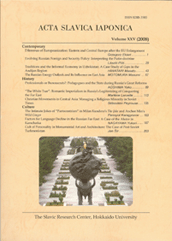Professionals or Bureaucrats? Pedagogues and the State during Russia’s Great Reforms
Professionals or Bureaucrats? Pedagogues and the State during Russia’s Great Reforms
Author(s): Eiki AabSubject(s): History
Published by: Slavic Research Center
Summary/Abstract: In the Great Reforms, the MNP endeavored to integrate, reorganize, and expand the general education system. For this purpose, the MNP had a keen need of teaching professionals. For this reason, the ministry, of its own accord, attempted to boost professional consciousness among teachers. Teachers, in turn, having had an opportunity to express their collective voice for the first time in Russian history, aimed to form a foundation to maintain their professional status. Russian professionals were being born inside the bureaucracy, and expected to function as a strong partner for the state bureaucracy. In fact, the professorate and gymnasium teachers attained high status, which led them to a fruitful partnership with the state. But, at the same time, they were faced with the serious dilemma of being both professionals and bureaucrats. Furthermore, the fact that elementary school teachers did not get privileged status and were forced to be independent from the state added further layers of complexity to the relationships between the state and professionals in late tsarist Russia. Such a structure was formed because the state remained functioning as the leading modernizer in Russian society in the middle and even by the end of the nineteenth century. The emerging teaching professionals did not expect to get much support from society, but instead hoped to be half-officials and protected inside the state. These complicated relationships, which emerged in the process of the Great Reforms, became an element of dynamic social and political transformation in late imperial Russian society.
Journal: Acta Slavica Iaponica
- Issue Year: 2008
- Issue No: 25
- Page Range: 89-111
- Page Count: 23
- Language: English

